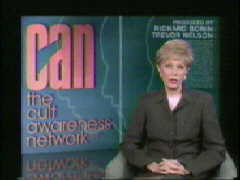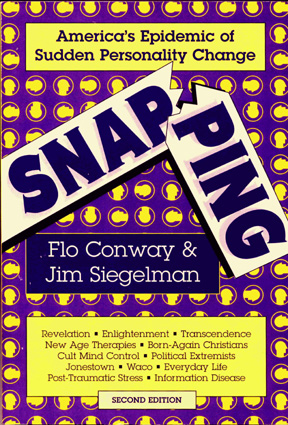In something of a strange spin about the work against destructive cults and the history of cult deprogramming Carol Giambalvo, a board member of the International Cultic Studies Association (ICSA) formerly known as the American Family Foundation (AFF), will present a program at an upcoming ICSA conference titled “The Anti Cult Cult.”
Giambalvo claims, “A very narrow boundary exists between the desire to help and the desire to control. Sometimes organizations and individuals can blur this boundary with good intentions, exhibiting the same totalistic control and ideology that exists on the other side of the line.”
Ms. Giambalvo was also once a regular contributer and board member of the Cult Awareness Network (CAN).
The coming panel discussion will include an explanation of how “dissent” over deprogramming supposedly led to “the demise of CAN.”
 However, according to reliable sources like CBS “60 Minutes,” the Washington Post, National Law Journal and American Lawyer, the “demise of CAN” was due to Scientology sponsored lawsuits.
However, according to reliable sources like CBS “60 Minutes,” the Washington Post, National Law Journal and American Lawyer, the “demise of CAN” was due to Scientology sponsored lawsuits.
Is Ms. Giambalvo attempting to construct a revisionist history concerning CAN?
Academic Anson Shupe was paid $500.00 per hour by Scientology lawyer Kendrick Moxon to testify against CAN in court.
“Are you saying the anti-cult movement is a cult?” the lawyer and Scientologist once asked his “expert witness” under direct examination referring to CAN. “It has aspects of it,” answered Shupe, “yes.”
Has Carol Giambalvo gone from CAN board member to actively supporting Anson Shupe’s opinions about a so-called “Anti Cult Cult”?
Cynthia Kisser didn’t see Shupe as either objective or credible, the former executive director of CAN called the college professor a “cult apologist.”
Giambalvo will be joined in her planned program by a former cult member who will “discuss her experience of a Ted Patrick Deprogramming (kidnapping), showing the destructiveness of this method and the long term damage suffered as a result.”
It appears that the former cult member and Giambalvo will attempt to posit the theory that this pioneer anti-cult deprogrammer may have done more harm than good through his intervention work.
 Will Ted Patrick be cast in the role of an “Anti Cult Cult” leader?
Will Ted Patrick be cast in the role of an “Anti Cult Cult” leader?
Mr. Patrick is described by authors Flo Conway and Jim Siegelman in their ground breaking book “Snapping” as follows:
“A controversial figure dubbed by the cult world Black Lightning, Patrick was the first to point out publicly what the cults were doing to America’s youth. He investigated the ploys by which many converts were ensnared and delved into the methods many cults used to manipulate the mind…His first-hand experiences with cult techniques and their effects led him to develop an antidote he named ‘deprogramming,’ a remarkably simple and-when properly used-nearly foolproof process for helping cult members regain their freedom of thought.”
Patrick explained cult deprogramming to Conway and Siegelman this way.
“The only thing I do is shoot them challenging questions. I hit them with things that they haven’t been programmed to respond to. I know what the cults do and how they do it, so I shoot them the right questions; and they get frustrated when they can’t answer. They think they have the answer, they’ve been given answers to everything. But I keep them off balance and this forces them to begin questioning, to open their minds. When the mind gets to a certain point, they can see through all the lies that they’ve been programmed to believe. They realize that they’ve been duped and they come out of it. Their minds start working again.”
Patrick summarized, “Deprogramming is like taking a car out of the garage that hasn’t been driven for a year…The battery has gone down, and in order to start it up you’ve got to put jumper cables on it. It will go dead again. So you keep the motor running until it builds up its own power…Once we get the mind working, we keep it working long enough so that the person gets in the habit of thinking and making decisions again.”
The cults hated Patrick and feared deprogramming.
Ted Patrick’s success working with families concerned about loved ones caught within cults begged the question, how could anyone be “deprogrammed” if they weren’t “programmed” in the first place?
The cults avoided answering this question by routinely vilifying Patrick and by trying to turn “deprogramming” into a “dirty word.”
Such an attempt to manipulate and redefine words is what thought reform expert Robert Jay Lifton calls “loaded language,” characterized by the thought-terminating cliché.
Giambalvo wants those attending her presentation to make a “clear distinction…between ‘exit counseling’ and ‘deprogramming.'”
She insists that deprogramming should be specifically and exclusively defined as only involuntary intervention, while Ms. Giambalvo believes efforts that require the voluntary cooperation of cultists should be called “exit counseling.”
Has the Giambalvo redefinition of the word “deprogramming” become thought terminating?
In popular culture deprogramming remains the most readily recognized word used by the general public to describe the process of cult intervention, either voluntary or involuntary.
 In fact, clinical psychologist Margaret Singer, the preeminent cult expert of the 20th Century and a board member of AFF/ICSA until her death, did not concur with Giambalvo’s proposed distinctions. Singer instead defined deprogramming simply as “providing members with information about the cult and showing them how their own decision-making power had been taken away from them” (“Cults in Our Midst” 1995).
In fact, clinical psychologist Margaret Singer, the preeminent cult expert of the 20th Century and a board member of AFF/ICSA until her death, did not concur with Giambalvo’s proposed distinctions. Singer instead defined deprogramming simply as “providing members with information about the cult and showing them how their own decision-making power had been taken away from them” (“Cults in Our Midst” 1995).
But by the time Singer had completed her book, Giambalvo and others were looking for a new definition.
It seems rather than denouncing cult propaganda they had embraced it.
However, this rigid would-be orthodoxy is without historical precedent.
Many deprogrammings were done on a voluntary basis, though more dramatic efforts that included physical restraint captured the public’s imagination, as popularized by Hollywood movies such as “Ticket to Heaven,” and “Split Image.”
At one time there were dozens of cult deprogrammers working full-time across the United States. Today that number has dwindled to perhaps a dozen. Many of those formerly referred to as “deprogrammers,” have chosen more politically correct titles such as “Family Intervention Specialist,” “Cult Information Consultant” and “Cult Intervention Specialist.”
ICSA for its part seems intent upon branding the name “Thought Reform Consultant.”
Giambalvo says that some “professionals” have “crossed boundaries” and that this can be seen by a “potential addiction to ‘being right,'” which might “surface in helping organizations.”
Perhaps this is true, but here is a conundrum.
Whose rigidity about “being right” coupled with a penchant for political correctness just might potentially place them within such a category?




no comment untill now